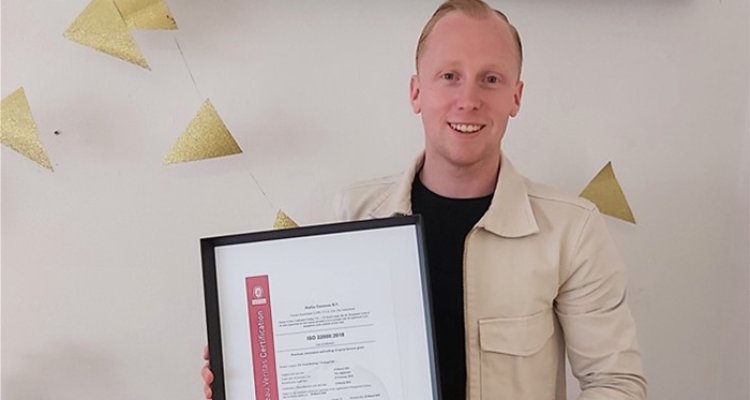
Alumnus testimonial
Alumni Lucas Visscher - User-oriented Food Quality
Lucas Visscher is passionate about sustainable food production and contributing to healthier food products. “I became interested in food quality management during my bachelor's studies in Business and Consumer Studies at Wageningen University, where I focused on food production and business related to it”. Lucas sought to deepen his knowledge in the field and through his study advisor found a perfect fit in food quality management.
One of the aspects I truly enjoy about my current job is the opportunity to contribute to sustainable food production and the development of healthier food products.
Current Role:
Lucas currently serves as the food quality and safety manager at MaGie Creations, a start-up company that focuses on circularity and sustainability in food production. The company produces food ingredients from the by-product of the beer brewing process, beer grain, and aims to sell them to other companies, particularly in the bakery industry. Additionally, MagGie Creations has its own line of products, including bars made from upcycled ingredients.
Favourite Aspect of the Job:
Lucas finds great satisfaction in contributing to sustainable food production and promoting food safety. Ensuring that the food produced is safe is the fundamental aspect for him, even before considering its taste or healthiness. His role allows him to apply the knowledge he gained during his studies and make a meaningful impact. “Working in a start-up environment has been both challenging and rewarding, as it offers the opportunity to build everything from scratch and develop a quality system yourself”.Experience with the MFQ Program:
The Master's in Food Quality (MFQ) program provided Lucas with essential knowledge and skills required in the field. “I believe the MFQ program has prepared me well for my current role. It not only equipped me with essential knowledge but also taught me how to effectively interact and communicate with other businesses in the industry, a crucial aspect of my current role”. The Management Research Principles courses taught in the program enabled Lucas to deliver valuable insights based on theory and apply them practically in a business setting. Additionally, the food law course opened his perspective on regulations and how to manage them within an organization.
Internship and Thesis:
For his thesis, Lucas initially did not receive his first choice of topic but worked his way around to link it to his interests in sustainable consumption. He explored the use of insects as a sustainable protein source and focused on the potential within European legislation to promote such sustainable food innovations. The freedom to research topics of interest within the chair groups was an aspect Lucas appreciated during his thesis project.
Career Path:
After completing his master's degree, Lucas had the opportunity to continue working at the organization where he did his internship. Combining his passion for sustainable production and developing quality management systems, he found a role that aligned perfectly with his interests and skills.
I believe that climate change increases food quality and safety issues while limiting resources, and that you need to be more careful in how you develop your food production system as a whole so that it is more efficient and safer.
Challenges and Opportunities in the Food Quality Management Sector:
Lucas believes that climate change and limited resources pose significant challenges for the food quality management sector. Ensuring food safety and managing risks related to climate change and limited resources are becoming increasingly important. He emphasizes the need for companies to be more careful in developing food production systems that are efficient and safe. Lucas also sees opportunities in promoting the use of ingredients that are not conventionally considered food, as it aligns with sustainability goals.
Advice to Aspiring Professionals:
“To aspiring professionals in the food quality management field, I would advise them to be open to change and innovation. Although the industry is governed by strict rules and regulations, there is room for creativity and progress. By combining different skills and expertise, we can drive innovation in regulations and food development. Additionally, I encourage prospective students to consider the MFQ program, which welcomes individuals from various backgrounds, even if they don't have a traditional food technology education”